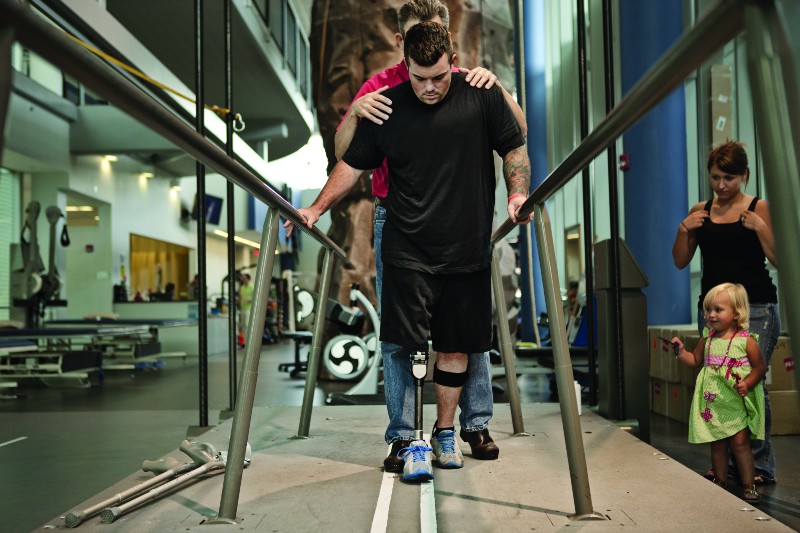
Dear Candidates,
Not unlike most of our nation's citizenry, I have never served in uniform -- largely due to the emergence of the all-volunteer force. Yet as a journalist, I've been privileged to observe the commitment and sacrifices made by the 1 percent that do.
Ten years ago, I learned more than I ever wanted to when a roadside bomb near Taji, Iraq severely injured my cameraman Doug Vogt and me. If not for the advances made in military medicine in recent years, I definitely wouldn't be here today. Nor would tens of thousands who have survived their wounds received in battle over the past 14-plus years.
I had the full support of ABC News and parent company Disney to give me every resource available to drive my recovery. Inspired by our experience, my family founded the Bob Woodruff Foundation to ensure that our veterans could enjoy the same access to resources, beyond those provided by the government.
The transition home can be filled with challenges -- especially for those who are ill or injured. Now, we have no illusions; the unique issues our service members face can't all be solved by the federal government. It will take a private-public coalition.

In partnership with Veterans on Wall Street, the Bob Woodruff Foundation commissioned the Center for a New American Security (CNAS) to explore the future of resources and support in context of the upcoming election.
The findings were published in "Passing the Baton: A Bipartisan 2016 Agenda for the Veteran and Military Community," a comprehensive overview of issues and recommendations.
We are hopeful that you will take the time to review and share the report, as well as answer a few questions that are top of mind for many post-9/11 veterans and the organizations supporting them.
1. As our nation's next commander-in-chief, you will not only inherit the care of 2.4 million active and reserve service members -- as well as their 3 million family members -- you will assume the task of supporting 21 million veterans. While there has been discussion related to national security and potential uses for military force, many veterans service organizations have voiced concern that little has been addressed relating to the needs of those affected by these policies. What role should the government play in caring for our veterans?
2. While combat operations have officially ceased in Afghanistan and Iraq, troops are still serving in both. Nearly 53,000 have been wounded in these conflicts, including 1,646 limb amputations. More than 327,000 sustained traumatic brain injuries. Undiagnosed illnesses relating to deployment exposures may be a significant issue in decades to come. Has your campaign developed a clear plan for the long-term healthcare needs of our military and veteran communities?
3. Mental health is a huge concern with the "hidden wounds of war," like post-traumatic stress and depression. Nearly a quarter of post-9/11 veterans have been diagnosed with some type of mental health issue. Though the Department of Veterans Affairs is the largest provider for mental health care and research in the nation, it has struggled to keep up with demand. How would you address this?
4. There has been some debate as to whether veterans should be able to seek health care outside of VA facilities. Some argue to completely eliminate the VA. What are your thoughts on this, or are these ideas too expensive?
5. Approximately 2.7 million service members, less than 1 percent of Americans, have served in Iraq or Afghanistan. Retention and recruitment are vital to the success of the all-volunteer force. Is voluntary service sustainable, or is it possible that you would reinstate the draft?
6. The percentage of women in the military is growing. More than 333,000 women deployed post-9/11 and more than 1,000 were injured in combat. Many women feel they are battling a male-focused system of care. Their suicide and unemployment numbers (per capita) are higher than men's. What is your position on women serving in combat zones? What would you do to address their unique needs?
7. Unlike prior generations, today's troops tend to serve for longer periods, so they're likely to have families who will need to be considered when planning for future needs -- including the potential of becoming caregivers. What would you change so that the government or private sector can concentrate more on the families?
8. Lastly, the private sector and nonprofits have a major role in the care of our veterans and their families -- a role dependent on the policies a new administration will look to put in place. Has your campaign developed a clear plan for communicating and partnering with them, and what role do you see the private and nonprofit sectors playing?
Thank you in advance for taking the time to inform the electorate of your positions related to the needs of our military and veteran community, as we all look to elect our nation's next commander-in-chief.
Respectfully,
Bob Woodruff
ABC News Correspondent, Co-Founder of the Bob Woodruff Foundation
This post originally appeared on Medium.